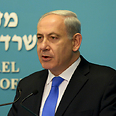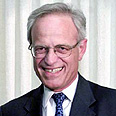
PM wants cabinet to vote on release of terrorists
Photo: Avi Ohayon, GPO

Indyk to mediate?
Photo: Michael Kremer
Prime Minister Benjamin Netanyahu
will bring the issues of peace talks resumption and Palestinian prisoners' release to a cabinet vote, a source familiar with the details told Ynet Sunday.
The source noted that the "prime minister wants to present the ministers with the issues of resuming negotiations and that of the prisoners, and put them up for discussion as well as approval."
Related stories:
- Arab League backs Palestinian stance in peace talks
- Report: Peres-Abbas talks paved way for renewed talks
- Hamas rejects Kerry's announcement: Abbas has no authority to negotiate
According to the source, "it is possible that the cabinet meeting will turn into a (governing) coalition meeting dealing with these issues."
Israel has already committed to the gradual release of 82 Palestinian prisoners serving time in Israel from the period prior to the Oslo Accords in four groups: The first at the beginning of the second month of negotiations, and the rest every two additional months. The release of prisoners in the latter stages is stipulated on the seriousness exhibited by the Palestinians as peace talks progress.
A senior military source said that the release of the prisoners is part of good will gestures aimed at appeasing the Palestinians: "All those imprisoned from the Oslo period needs to be released – especially after we released Hamas prisoners. Morally, this is difficult in regards to the (bereaved) families, but in the current situation, we can and should release them."
1967 lines
In covert talks, Netanyahu said that he would object to the 1967 borders topping the agenda during peace negotiations with the Palestinians.A senior political source said Sunday that it is the prime minister's intention that all the core issues be discussed. Nonetheless, they said that regarding a construction freeze outside of the areas considered major settlement blocs "there hangs a big question mark."
According to the source, "Netanyahu said that construction will continue within the blocs, but (regarding the issue of construction outside of them) there hangs a big question mark."
According to their assessment, during the talks held between Netanyahu and US Secretary of State John Kerry, an agreement was reached regarding settlement construction, in which construction can continue in Ariel, Gush Etzion and Ma'aleh Adumim, which are considered the major settlement bloc, while in the rest of the territories there will be a "de-facto freeze," in which no real construction projects will break ground.
On Saturday, the PMO denied that there was a construction freeze, but failed to elaborate regarding which areas.
Jerusalem insisted that the negotiations would span over nine months and during this time period the Palestinians will be barred from promoting any political or legal procedures through international organizations. In other words, the Palestinians cannot attempt to secure statehood by international political means nor can they attempt to try Israel in international courts.
In return, Israel will release the 82 Palestinian prisoners, and, in addition, the Palestinian Authority will enjoy major financial assistance from the United States and the European Union, which will allow them to promote numerous civilian projects in areas B and A, but not in C – which Israel forbids. "We won't object to antennas" in area C, a military source said, "but industrial parks will not be constructed in this area."
Mediation
Saturday it was reported that the US will appoint Martin Indyk, the US's former ambassador to Israel, as a mediator in the peace talks.
The reports have not been officially confirmed.
A senior source commented on the appointment and said "Indyk is one of the names being floated around, but we are still waiting for word from the Americans in this regard."
- Receive Ynetnews updates
directly to your desktop















